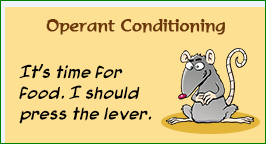What are predominant practices in your home with respect to reinforcing behaviors and for modifying behaviors?
Since I have a pre-school child, practicing reinforcements is important so that at an early age he can understand its effect as he grows. The following are ways on how I reinforce behavior at home.
- I praise my child for doing a job like understanding how to keep his toys in box, throwing his soiled diapers in the rubbish bin, button and unbutton his shirt and doing a simple errand like wiping the table dry due to spilled water. I deliver the praise during the time that he is actually doing the task since I am guiding him to do the task and after he finishes the task. I speak with an enthusiastic voice to sound that I am thrilled of what he did. Sometimes I hug him or do high five or we smile together as he finish doing the task.
- I use fun time as a reward for good behavior. If he is moody and grumpy or very naughty, I usually say that he cannot get a new “Baymax robot” or “lego toy” or “go to the park to play” or “cannot watch his favorite TV show” if he remains like that.
- In the morning before he goes to school, I always tell him to be a friend to everyone in the class and share his toys with them so he can play with his friends’ toys too.
- I do prompts for him to do things or follow direction like:
- When we are going on a travel, I usually do prompt like: “Paul, Please fasten your seatbelt we’re about to go.”
- If I see his toys all scattered on the floor: Please collect your toys and put them in the blue box.
- When he finishes eating: Please put your dish in the sink.
- When we are at the restaurant: You can have your strawberry juice if you will not play with utensils and condiments.
- To apologize: “When we hurt someone, we say, ‘I’m sorry.'”
- To receive a present or treat: What do we say when someone gives us a treat or a present? We say “Thank You”.
So, I try to be consistent with the rules that I set to my child, reinforce the behaviour that I want to see and I give an immediate feedback as soon as the task or behaviour is carry out. In this way making compromise or explaining may sound simple for him to understand and remember.
The scenarios described above emphasizes operant conditioning. Operant conditioning is a type of learning where behaviour is controlled by consequences. It entails the use of positive and negative reinforcements as well as positive and negative punishment. It likewise involves voluntary behaviors and is maintained over time by the consequences that follow those behaviors.
Recall your past experiences where behaviorist approaches have been used to modify your behaviors.
Which experiences do you consider positive (helpful and pleasant)?
- My mother usually reads us a story or recites a nursery rhyme during bed time. So, when it’s bedtime it means that it’s story time or nursery rhyme. This also influences me to become fond of literature.
- My primary and secondary school learning opens my mind in the wonders of science and traveling. This time I’m teaching science as a profession and I travel with my family (though locally) every time we have the opportunity to travel.
In the attempt to modify your behavior, can you cite behaviorist approaches that successfully modified your behavior/s but turned out to be unpleasant experiences? When I was in high school I wasn’t really confident in any mathematical exercise. My Math teacher gave us homework which consists of five problems. I only solve 4 out of 5 since I don’t know how to answer the other one. Come the next day she roam around the class and check each of our homework. When she noticed that my homework was incomplete she gave me a pinch in the ear. It wasn’t me only, my classmates who had incomplete homework too. Missing number of homework is equal to the number of pinches that the teacher gives. So I associate incomplete math homework with pinch. From that incident, I tried my best to completely answer my Math homework by asking the help of my elder brothers who are good in math and I never got a pinch ever again.
Were there occasions wherein your behavior/s became more undesirable rather than improved?
Experience 1: When I was in Grades 1, 2, 3 and 6. I was very good in Math because my teacher has a unique way of teaching math in a simple way that I can understand. Also, she sets a desirable learning environment by using visual aids and flash cards, hands-on materials like the abacus, cubes and sticks for counting. I had a positive impression about Math and I find it easy to solve and analyze problems causing my grades to be high. However, when I was in Grade 4 and 5, my teachers’ technique in teaching seems difficult to understand causing me to struggle in learning. My teachers tend to discuss the lesson with less demonstration of the process on how to solve problems. These scenario also happen when I was in Grade 7 and 8. When I reach Grade 9, my math ability improved. I even qualified for the top ten in the class for Math quizzer however when it was cut for the top five I started to doubt myself and compared my ability to the rest resulting for a failure :(. Even when I reach College, similar case happen, that is — I always doubt myself whether my solution to any mathematical problem is right and I only tried my best to answer questions when pressured to do so. Until now, I always have that negative feeling that learning Math is hard.
Experience 2: Considering my previous example, sometimes if my brothers didn’t help me in my Math homework, I usually ask my friend to help me complete my homework but if she’s lazy to teach me she will just let me copy her answers. So, I and some of my classmates who have incomplete answers will tend to copy our friends answer just to avoid the punishment given by the teacher. These are not good at all because it never measures our true potential due to the anxiety and fear that was brought about by the punishment.
Experience 3: When I was a kid my father was a disciplinarian. He practices corporal punishment by using a bamboo stick. Every time we are naughty or stubborn, and we didn’t listen to his three warnings he will always hit our bottom with a belt. So, every time we hear him starts counting we actually stop our misbehavior to avoid the punishment. As I grow up, I associate his counting 1, 2, 3 or his holding of a bamboo stick as an upcoming punishment even though sometimes it’s not what he meant :).
Experience 4: Once every year, I have to travel to Thailand-Myanmar border to renew my visa. The road going to this area is winding and sometimes rugged. When it was my first time to travel I remember that I ate fish for dinner a night before the travel. On the day that we travel, I got car sick. So, every time we are scheduled to travel to the border I make it a point not to have fish for dinner and even for other long travel I avoid eating fish.
The experiences that were described above explain about Classical conditioning. Classical conditioning is a learning process in which something (conditioned stimulus) that had previously produced a specific response becomes associated with something (unconditioned stimulus) that produces the response. As a result, the conditioned stimulus will create the response that the unconditioned stimulus produces. Similarly, classical conditioning involves automatic or reflexive responses.
How would you prefer behaviors to be regulated and/or modified at home or in school?
I prefer to use a mix of classical and operant conditioning in terms of behavior modifications. When and how to use each? It’s a case to case basis and so depends on the type of situation. Nevertheless, I will give more emphasis on the use of positive and negative reinforcements which I believe is the most powerful and useful method of changing or developing behavior both at home and at school.
Moreover for behavior modification to be effective I have to decide and tell what specific behavior do I want to observe and try to reinforce these behaviors in case that they occur.
Image source: http://www.buzzle.com/img/articleImages/607827-3211-56.jpg

